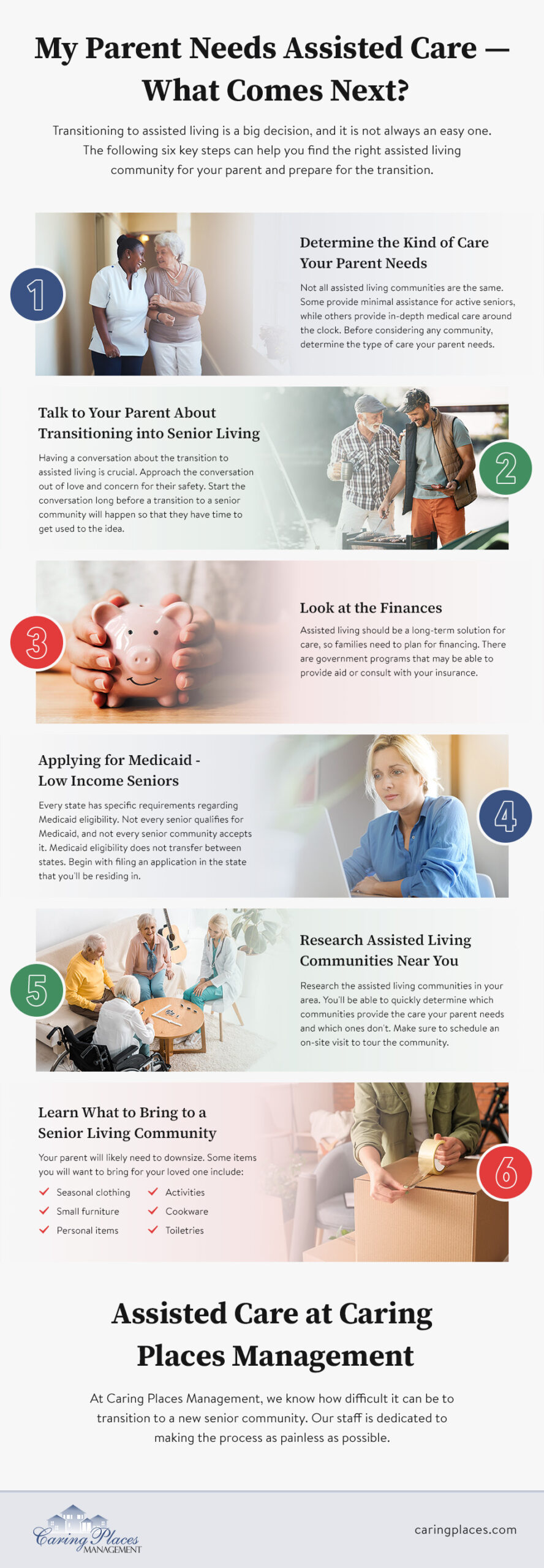For many seniors, there comes a time when they may not be able to live safely on their own. Assisted living can be an excellent option for seniors. However, transitioning to assisted living is a big decision, and it is not always an easy one.
There can be confusion about what to do next and what steps to take to prepare. The following six key steps can help you find the right assisted living community for your parent and prepare for the transition.
1. Determine the Kind of Care Your Parent Needs
Not all assisted living communities are the same. Some provide minimal assistance for active seniors, while others provide in-depth medical care around the clock. Before considering any community, you should determine the type of care your parent needs.
Take an inventory of what daily activities they need help with or what they can no longer safely do on their own. If possible, work with a professional who can help you recognize patterns and plan for the future. You can also consult a doctor about developing a plan to help inform your choice.
2. Talk to Your Parent About Transitioning into Senior Living
Sometimes, transitioning into senior living is welcomed by older adults, while other times, it is not. No matter the situation with your parent, having a conversation about the transition to assisted living is crucial. Approach the conversation out of love and concern for their safety.
Start the conversation long before a transition to a senior community will happen so that they have time to get used to the idea. You can also involve other family members. Finally, make sure your parent is involved in the decision-making process. They should have as much say as possible about their future living arrangements.
3. Look at the Finances
One of the most important considerations for families when it comes to assisted living is finances. Assisted living should be a long-term solution for care, so families need to plan for financing the cost for years.
Often, assisted living is comparable to living in a family home when you consider all the expenses that come along with homeownership. If your family does not have the means to make the transition, there are also government programs that may be able to provide aid or consult with your insurance.
4. Applying for Medicaid – Low Income Seniors
Every state has specific requirements regarding Medicaid eligibility. Not every senior qualifies for Medicaid, and not every senior community accepts it. Medicaid eligibility does not transfer between states. Begin with filing an application in the state that you’ll be residing in when you transition.
Even if approved for Medicaid, the program may not cover all costs of assisted living or care needs. Make sure to work with your local representative to find out what is covered and what your remaining obligations are.
The easiest way to apply is through the online application. However, you can also apply by mail. If you need help with the application, you can call your local office, where they can answer questions and provide additional resources.
5. Research Assisted Living Communities Near You
Once you’ve determined what your loved one needs, research the assisted living communities in your area. You’ll be able to quickly determine which communities provide the care your parent needs and which ones don’t. Once you’ve narrowed it down to a few communities, go for an on-site visit to tour the community. An on-site visit will enable you to see the living accommodations as well as meet the staff that will be working with your loved one on a daily basis.
6. Learn What to Bring to a Senior Living Community
If this is the first time you’ve moved a parent into a senior living community, you may be unsure what to bring. Your parent will likely need to downsize, as some of their furniture and belongings may not fit their new living accommodations well.
Some items you will want to bring for your loved one include:
- Seasonal clothing
- Small furniture
- Personal items
- Activities
- Cookware
- Toiletries
To help you determine what to bring to your new community, work with the on-site staff who can help you decide what will best fit your new living accommodations.
Assisted Care at Caring Places Management
At Caring Places Management, we know how difficult it can be to transition to a senior care community. Our staff is dedicated to making the process as painless as possible. We are always available to answer questions and assist with anything that comes up along the way. To schedule a tour or learn more about our services, give us a call today.


